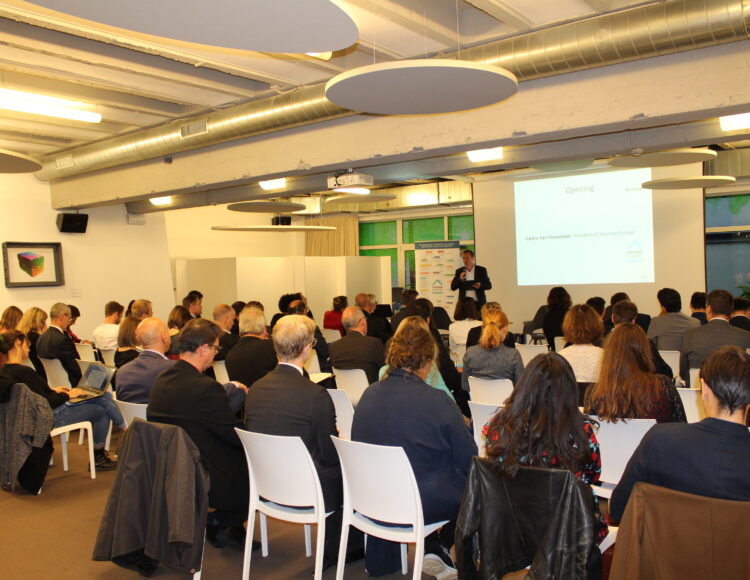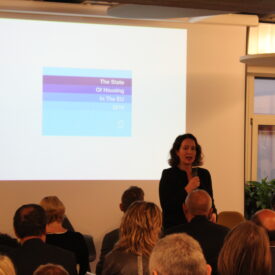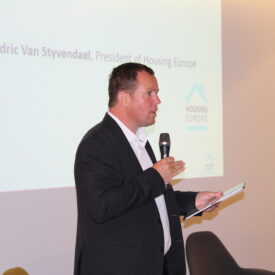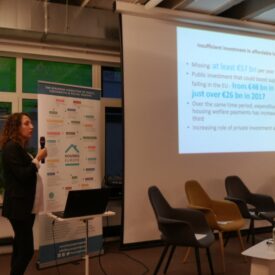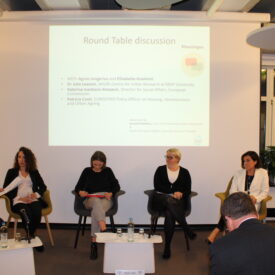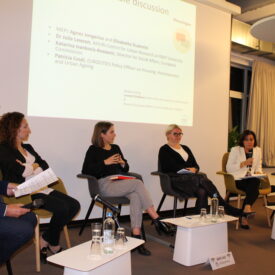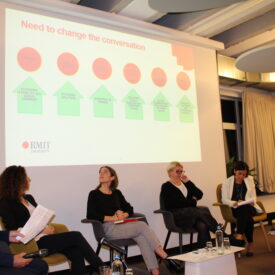During a week packed with European Parliament hearing of the new Commissioners who will be leading the legislative work in this new term for the European Institutions, Housing Europe put the housing question on the table with the launch event of its flagship research report ‘The State of Housing in the EU’. The 2019 edition of what has been now established as the biennial compass for Europe’s housing sector attracted housing professionals, policy makers, researchers as well as activists in the European Capital for a debate that generated consensus: it’s about time to change the conversation around housing in Europe and stop neglecting the housing crisis that’s still well on.
Housing Europe President, Cédric Van Styvendael opened the event highlighting the fact that despite the evidence about the housing crisis, limited action is being taken to address at EU, national and local level. Cédric said that “this report comes as a follow up to the recent International Social Housing Festival in Lyon to provide solid proof to our claim that the EU needs an affordable housing action plan that should be among the priorities of the new European Commission. The national policies as well as the European agenda in multiple housing-related areas are more than ever intertwined with the local dimension, therefore we are convinced that housing should be the vehicle for the actual implementation of the European Pillar for Social Rights”.
Housing Europe Research Director, Alice Pittini, lead author of the report gave an overview of ‘The State of Housing in the EU’ key findings. Alice stressed that “10.2% of the EU households spent over 40% of their disposable income on housing costs in 2017, but this share increases to 37.8% when considering those at risk of poverty. With housing into account, 156 million people are at risk of poverty compared to 85 million before housing costs”. Alice made the case for the insufficient investment in affordable housing while illustrating the really alarming link between housing and the growing social divide. She also explained how cities are at the forefront of the housing challenge, which led to dedicating for the first time a whole chapter to this new housing reality. Alice closed the presentation showcasing how the role of public, cooperative and social housing providers keeps evolving pushing them to deliver more than just a roof.
The second part of the event featured a roundtable discussion that brought together MEP Elisabetta Gualmini, Dr Julie Lawson of the AHURI-Centre for Urban Research at RMIT University, Katarina Ivankovic-Knezevic, Director for Social Affairs at the European Commission and Patricia Couti, EUROCITIES Policy Officer on Housing, Homelessness and Urban Ageing who had the chance to comment on the report findings.
MEP Gualmini stressed that “the air has changed when it comes to social housing at the EU level” and called for investment in the whole housing chain, as “we cannot miss the opportunity since the dilemma is ‘Invest in housing or social conditions collapse’”.
Mrs. Ivankovic-Knezenic said that the time has come for the European Commission to do more and will do more in the fields of social housing and eradication of homelessness, highlighting the need for collaboration among different DGs along the lines of Nicolas Schmit, the Commissioner’s-designate for Labour and Social Affairs hearing that took place the same day in the morning.
Dr Julie Lawson delivered the quote of the day, suggesting that “We should start looking at social housing in the way we look at bridges, hospitals etc, i.e. as essential infrastructure”. “Social housing should not be marginalised as “ambulance” service against market failure”, she added. She closed her intervention, presenting some really stimulating proposals how the conversation around social housing can change.
Finally, Patricia Couti From EUROCITIES explained how more and more cities across Europe pledge to implement the European Pillar of Social Rights using housing as the main vehicle. Patricia underlined that all of them stress the affordability factor as the affordable housing crisis keeps getting worse.
